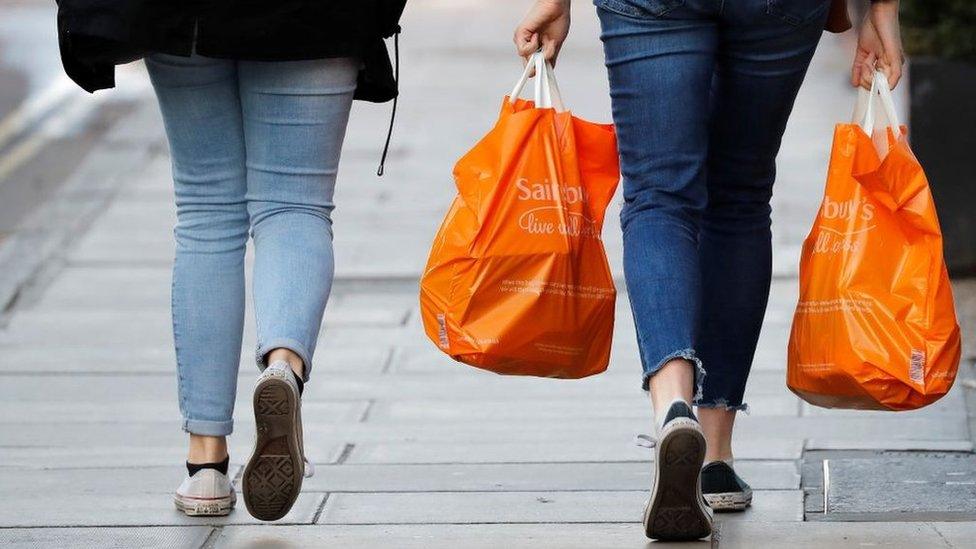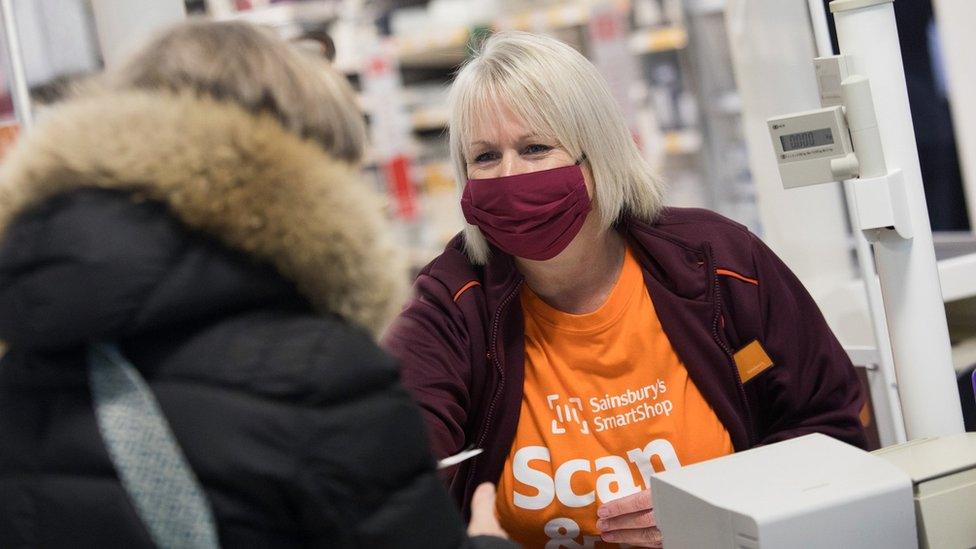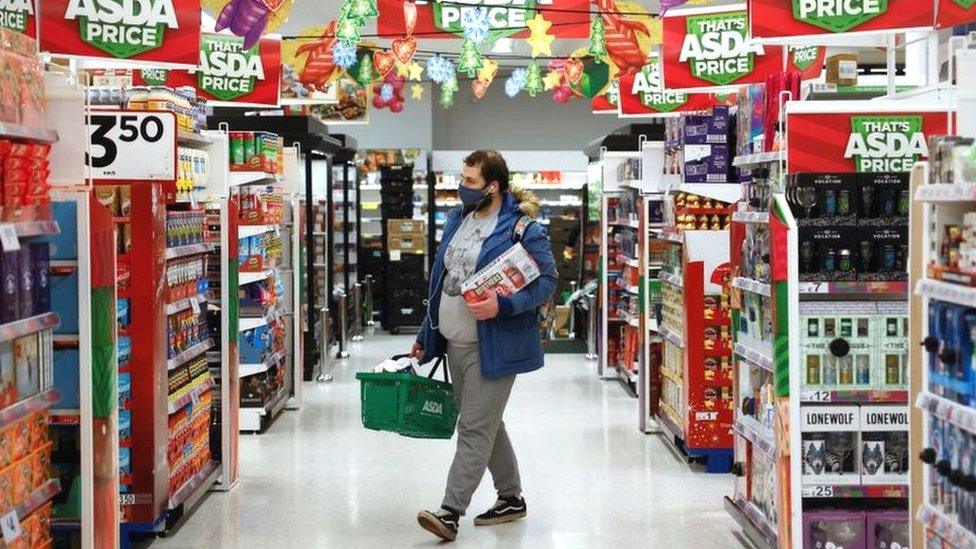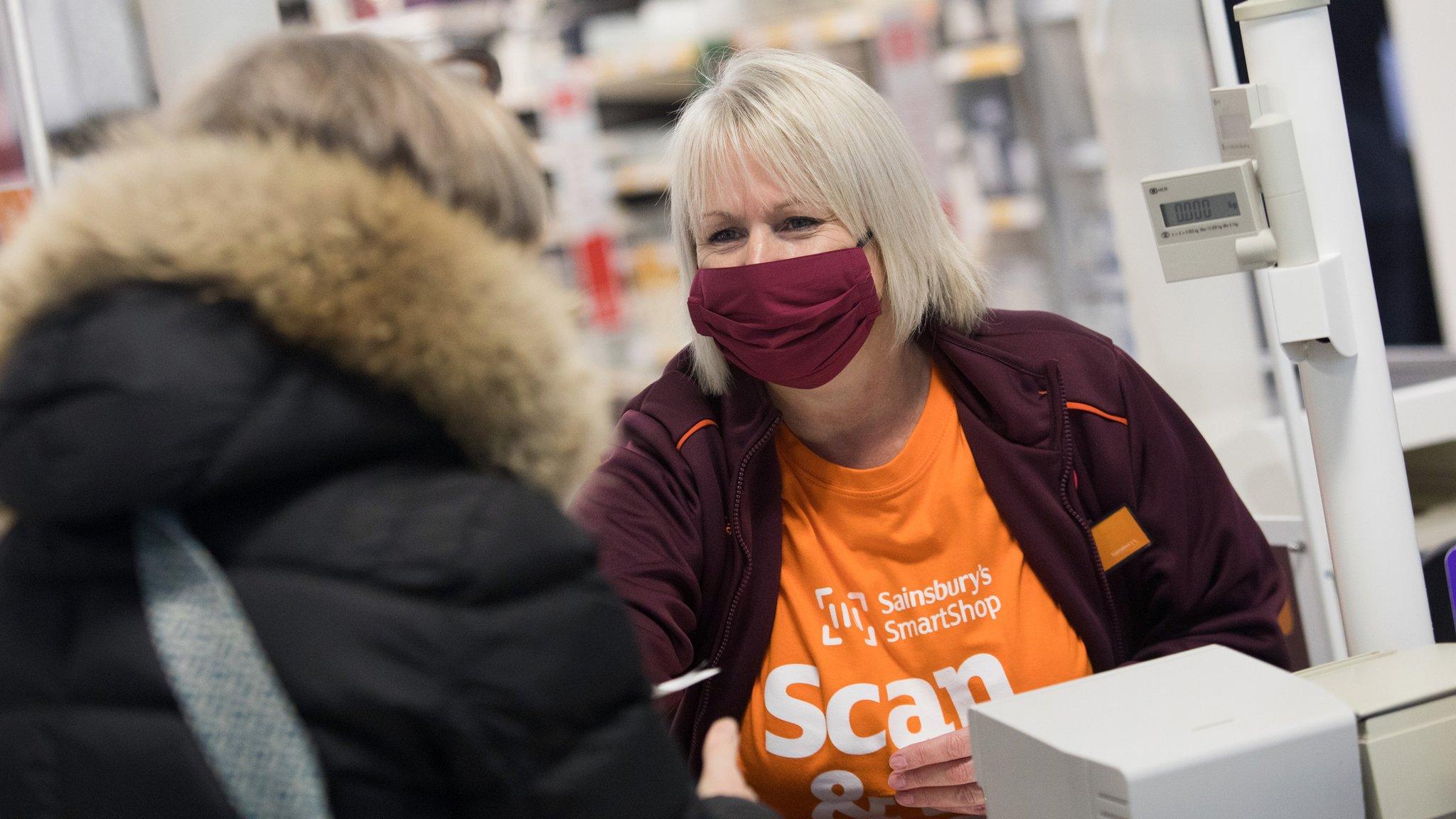Champagne sales drive bumper Christmas at Sainsbury's
- Published

Strong sales of premium food and champagne over Christmas have put Sainsbury's on track to boost profits.
Britain's second biggest supermarket has raised its full-year profit guidance to "at least" £720m before tax, up from £660m.
Customers spent more on treats, as well as record amounts on champagne and sparkling wine for festivities.
Grocery sales over Christmas rose by 0.1% in the six weeks to 8 January, compared to the year before.
Sales of food and drink saw a boost of 6.8% in comparison with pre-pandemic levels.
The retailer's chief executive said it was down to more people eating at home, although formal rules restricting gatherings weren't in place this last Christmas.
Simon Roberts said: "I am really pleased with how we delivered for customers this Christmas."
He added that shoppers had splurged more on party food and desserts from its premium Taste the Difference range over the holidays.
While Christmas trading saw some bright spots in food, Mr Roberts said in a call with journalists that supply chain problems had affected the availability of toys and electrical good at Argos in particular, with "significant challenges" expected in 2022 as well.
In the grocery aisles, consumers opted for more meat-free products, with Plant Pioneers' No Gammon Joint and No Salmon Encroute proving popular Christmas centrepieces.
"The backdrop was challenging and our teams worked hard throughout the year to make sure we had all of the products everyone wanted," Mr Roberts said.
The supermarket said on Wednesday that spiralling cost inflation had been offset by savings as well as the better-than-expected grocery sales.
Toys and tech dip
Overall though, Sainsbury's said that like-for-like sales, excluding fuel and the effect of new shops opening, fell by 4.5% in the three months to 8 January.
General merchandise, which includes homeware, toys and other goods from Argos, fell by 16% year-on-year.
The group said that it was down to comparisons with a "strong performance" during lockdown the previous Christmas, as well as a decision to offer fewer discounts.
Toys and tech gadgets in particular suffered with declines seen in the double digits.
The retailer said in a statement on Wednesday that global supply chain issues had affected the availability of in-demand products.

But the group said cost reductions at Argos, driven by the group's decision to shut 420 of the brand's branches, helped strengthen its profits.
Ross Hindle, analyst at Third Bridge, said: "December's trading was particularly strong for UK supermarkets, with home working translating into home eating and fewer consumers dining out as Omicron swept the country.
"Sainsbury's should be able to hold on to its gains thanks to its loyal customer base and innovation around product lines", he said, noting that the retailer had added more than 600 new products during the last few months.
But he said that rapid delivery firms and discount supermarkets like Aldi or Lidl could still pose a threat.
Online orders jump
Over the festive period, Sainsbury's fulfilled more than 700,000 online orders per week, with orders on its website and app jumping 41% in the week to Christmas.
It also introduced a "price match" campaign, which included matching around 150 prices with Aldi in a bid to keep prices lower for customers.
The firm recently said that it would become the latest UK supermarket to pay shop workers at least £10 an hour.
It will increase its basic rate from £9.50 to £10 an hour for staff across its supermarkets and Argos stores from 6 March, following similar moves by Lidl and Aldi last year.
Sainsbury's shares were up 1.75% in early trading in London on Wednesday following its trading update. Tesco and Marks & Spencer are due to release Christmas trading updates on Thursday.
Other companies updating on their Christmas performance on Wednesday included JD Sports, Dunelm and Whitbread:
Sports retailer JD Sports raised its annual profit forecasts on the back of "positive" performances across Christmas and Black Friday. Total sales for the 22 weeks to 1 January were more than 10% ahead of the same period in 2020.
The homeware chain Dunelm said it saw a "record performance" in the 13 weeks to Christmas, with sales up 13% to £407m versus the year before.
Premier Inn owner Whitbread said stays at its UK hotels had remained strong in recent weeks, despite the spread of Omicron. But its food and drink sales dipped.
Related topics
- Published5 January 2022

- Published7 January 2022
